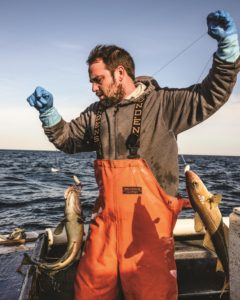Along the American coastline, historic fishing communities — from the tip of Cape Cod to Alaska’s Bristol Bay — are plagued with a problem. This time, it’s not overfishing, complex regulations, or slow markets. Rather, it’s a culmination of years of these challenges, and it worsens with every tick of the clock. It’s called “the graying of the fleet.”
In response to mounting concern within an aging industry, the federal government recently passed the Young Fishermen’s Development Act (YFDA), signed into law on Jan. 5, 2021.
With an annual budget of $2 million, funded entirely by fees from fishing regulation violations, the YFDA will dole out grants to eligible fishing associations, universities, and tribal organizations for programs to help attract and support younger fishermen. There will also be a mentoring program to connect retiring fishermen with new ones.
The Cape Cod Commercial Fishermen’s Alliance has already launched a pilot training program that could be a glimpse of the future if some of that funding lands here.

“Our program targets that group of people that are interested in fishing but that don’t know how to enter the industry in a meaningful way,” said Stephanie Sykes, the program and outreach coordinator at the alliance. Sykes is also a lobbyist for the YFDA and a commercial fisherman.
Ken Baughman, a boat maker, software engineer, and new commercial fishermen, took part in the alliance program last March to learn about safety skills before his first summer fishing commercially.
“A lot of the time, boat safety comes across as just a checklist of things you need on your boat,” Baughman said. In the course, he said, he got insights on safety directly from people that have gotten in trouble, not companies advertising safety equipment.
Baughman, who grew up fishing in Falmouth, started selling his catch for the first time last summer. Though he didn’t have the season he wanted, his plan is to make a living by splitting his time between commercial fishing and boatmaking.
The seafood industry contributed $100 billion to the GDP and 1.7 million jobs to the U.S. economy in 2016. In Massachusetts, recreational and commercial fishing supported 97,000 jobs. Yet it’s an industry that’s getting more and more difficult for small players — small-boat fishermen — to enter.
That’s because “there are barriers to entry that are higher than in previous generations,” said Seth Rolbein, director of the Cape Cod Fisheries Trust.
From Sykes’s point of view, the main challenge is teaching young fishermen how to navigate commercial fishing’s complex business and regulatory environment. “You pretty much have to be a lawyer to understand some of the intense regulatory processes now,” she said.
“Fishermen can know all the ins and outs of how to fish,” said Pam Anderson, director of business and credit programs at the Community Development Partnership, but managing finances, selling fish to dealers, and handling compliance all require business skills that fishermen don’t learn on the water.
The barriers are more than educational. The price of a permit, boat, and essential gear means taking on hundreds of thousands of dollars in debt. And as fisheries become more tightly managed, fishing is a limited-access game.
Will Ligenza, captain of the F/V The Getaway, a 41-foot scallop boat out of Chatham, grew up handlining cod with his dad. He finally got his own business under way seven years ago, and, at 39 years old, he’s one of the younger fishermen in the business on Cape Cod. Ligenza has been following the legislation to encourage younger people to enter fishing and thinks it’s a good thing. “But,” he said, “my question is, will it come with fishing permits?”
Mike Rathgeber, longtime fisherman and contributor to the Independent, agreed. “Back in the ’70s, when I was commercially fishing,” he said, “if our costs went up, we’d fish more. That was the answer to everything — just fish more! That’s not an option anymore.”
Still, making ends meet as a fisherman is not impossible, according to Sykes, who is 26. “I’ll say this,” she said. “I fish full-time and I paid off all my student loans.”



